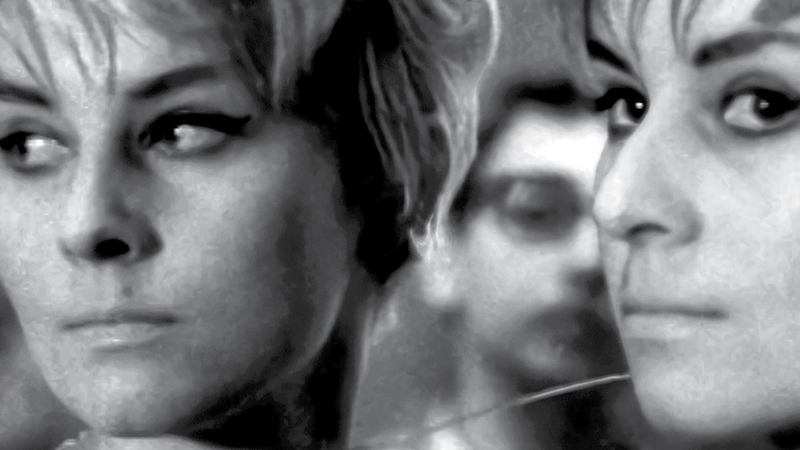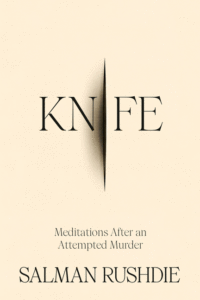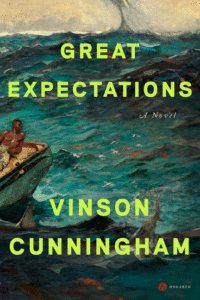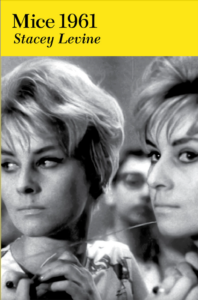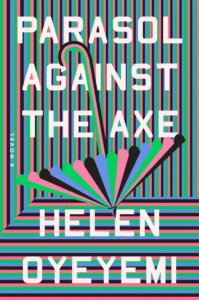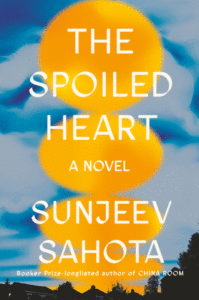This week’s feast of fabulous reviews includes Sanjena Sathian on Salman Rushdie’s Knife, Christian Lorentzen on Vinson Cunningham’s Great Expectations, Lydia Millet on Stacey Levine’s Mice 1961, Hannah Gold on Helen Oyeyemi’s Parasol Against the Axe, and Ron Charles on Sunjeev Sahota’s The Spoiled Heart.
“Which Rushdie wrote Knife? Is this new, buzzy memoir the work of a man securing his legacy? Or of a man reflecting on a writing life interrupted by stranger-than-fiction events? Knife is in part about—and in some sense itself is—a battle between the two most prominent Rushdies: Great Writer and Great Man, artist and advocate, private person and public figure. At its best, the book speaks to what it has been like for someone who thinks of himself as a writer by vocation and a free-speech activist by conscription to try to make art, not to mention a life, under extraordinary circumstances. At its worst, Knife can leave the reader feeling unsure of which Rushdie it speaks for, which Rushdie we should remember … Given the circumstances, it is miraculous that anyone would manage to write anything coherent about such a recent trauma, let alone anything good. And Knife is often good. The first chapter, in which Rushdie recounts the attack itself, contains some of the most precise, chilling prose of his career … Indeed, Knife is at its strongest when Rushdie-the-novelist narrates the material of his own life … The rest of Knife is less precise than the material about the A. The word meditations in the title may be a preemptive defense against the accusation that, as a complete work, Knife is somewhat inchoate. But the lack of clarity in Knife’s mission can feel distracting … Rushdie need not have more deeply inhabited Matar, but there is complex social context around the man and his radicalization that Knife might have explored more fully to truly comprehend the author’s near death … That ability to make history intimate is his greatest talent as an artist; the gift predates the fatwa. It may be cruel to expect Rushdie to craft something that both addresses society and feels artistically transcendent in the face of such a personal crisis. But he has managed this feat before … If Knife sometimes feels like it was hastened to press, if its conclusion reads like an epiphany forced on deadline, it’s probably because Rushdie, reasonably, wants to spend his remaining years on the struggle he actually chose, not the one he was coerced into.”
–Sanjena Sathian on Salman Rushdie’s Knife (Vulture)
“One of the things that always bugged me about Obama—aside from his extension of his predecessor’s neoconservative foreign policy, the bonanza for private health insurers in Obamacare, the supine orientation toward financial institutions, and so on—was his hostility toward cynics. In his usage, the word tended to designate anyone opposed to him, his policies, or hope itself. He generally meant Republican naysayers (right-wingers took notice: the Cato Institute issued an item on Obama’s ‘War on Cynicism’), but also disaffected millennials from among his original core of supporters, the recently hope-deficient … David Hammond, the narrator of Vinson Cunningham’s not quite ironically titled first novel Great Expectations, isn’t exactly a cynic, but he is possessed of a pessimism beyond his years … That he has waited sixteen years to write a book drawing on his experience and chosen to write a literary novel rather than a résumé-bolstering memoir or a Beltway potboiler speaks to an idealism divorced from politics. And though the novel obviously folds in autobiographical material and David mentions several times a vague ambition to become a writer, I wouldn’t call it autofiction in the way the term has been applied to Karl Ove Knausgaard, who framed My Struggle as an act of confession, or to Ben Lerner, who draws attention to his similarities with his alter egos even as their stories deviate from his own biography. Cunningham is up to something more old-fashioned … Cunningham’s novel partakes of three modes—the political, the personal, and the critical—and some of its most fascinating moments occur at the intersections … Most novels about young people are written by young people and tend to rely on comic exaggeration, which tyro novelists lean on to cover for their lack of experience. Coming to the art form in middle age, Cunningham doesn’t need that crutch. His humor is hard-earned and dry.”
–Christian Lorentzen on Vinson Cunningham’s Great Expectations (Bookforum)


